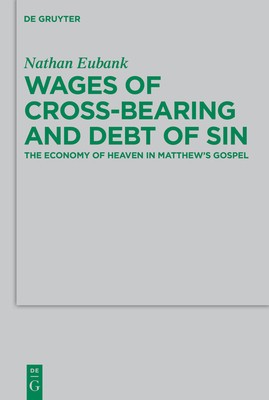
- We will send in 10–14 business days.
- Author: Nathan Eubank
- Publisher: De Gruyter
- Year: 2013
- Pages: 247
- ISBN-10: 3110487985
- ISBN-13: 9783110487985
- Format: 15.5 x 23.1 x 1.5 cm, minkšti viršeliai
- Language: English
- SAVE -10% with code: EXTRA
Reviews
Description
In comparison to Mark and Luke, the First Gospel contains a striking preponderance of economic language in passages dealing with sin, righteousness, and divine recompense. For instance, sin is described as a debt, and righteous deeds are said to earn wages with God or treasure in heaven. This study analyzes Matthew's economic language against the backdrop of other early Jewish and Christian literature and examines its import for the narrative as a whole. Careful attention to this neglected aspect of Matthew's theology demonstrates that some of the Gospel's central claims about atonement, Jesus' death and resurrection, and divine recompense emerge from this conceptual matrix. By tracing the narrative development of the economic motif, the author explains how Jesus saves his people from their sins and comes to be enthroned as Son of Man, sheds new light on numerous exegetical puzzles, and clarifies the relationship of ethical rigorism and divine generosity.
EXTRA 10 % discount with code: EXTRA
The promotion ends in 23d.22:23:22
The discount code is valid when purchasing from 10 €. Discounts do not stack.
- Author: Nathan Eubank
- Publisher: De Gruyter
- Year: 2013
- Pages: 247
- ISBN-10: 3110487985
- ISBN-13: 9783110487985
- Format: 15.5 x 23.1 x 1.5 cm, minkšti viršeliai
- Language: English English
In comparison to Mark and Luke, the First Gospel contains a striking preponderance of economic language in passages dealing with sin, righteousness, and divine recompense. For instance, sin is described as a debt, and righteous deeds are said to earn wages with God or treasure in heaven. This study analyzes Matthew's economic language against the backdrop of other early Jewish and Christian literature and examines its import for the narrative as a whole. Careful attention to this neglected aspect of Matthew's theology demonstrates that some of the Gospel's central claims about atonement, Jesus' death and resurrection, and divine recompense emerge from this conceptual matrix. By tracing the narrative development of the economic motif, the author explains how Jesus saves his people from their sins and comes to be enthroned as Son of Man, sheds new light on numerous exegetical puzzles, and clarifies the relationship of ethical rigorism and divine generosity.


Reviews